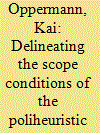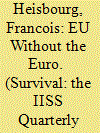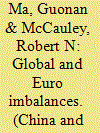|
|
|
Sort Order |
|
|
|
Items / Page
|
|
|
|
|
|
|
| Srl | Item |
| 1 |
ID:
131054


|
|
|
|
|
| Publication |
2014.
|
| Summary/Abstract |
The poliheuristic theory of foreign policy decision making would benefit from being clearer in spelling out the conditions under which it holds more or less analytic promise. The article makes the case that the concept of issue salience can help the theory address its shortcomings in this respect. In particular, the explanatory power of poliheuristic theory's two-stage model largely depends on the noncompensatory principle of major domestic political loss avoidance on the first stage of the model to simplify the choice set to be considered on the second stage. This is more likely to happen, however, in the case of issues that are highly salient to a government's selectorate than in the case of issues that are of low salience in the domestic arena. The poliheuristic theory should thus be more powerful if it is applied to domestic high-salience rather than low-salience decisions. These theoretical contentions are illustrated in a case study on the decision making of the British Labour government under Tony Blair in the fields of European security and defense policy and the single European currency.
|
|
|
|
|
|
|
|
|
|
|
|
|
|
|
|
| 2 |
ID:
128842


|
|
|
|
|
| Publication |
2014.
|
| Summary/Abstract |
The single currency was supposed to have led to greater political union, but the policies taken to ensure its survival are having the opposite effect. An orderly retreat from the euro might be the EU's least-bad option. As the euro area enters its seventh year of economic stagnation, the future of the European integration process remains in suspense. In the medium-to-long term, highly divergent scenarios remain possible, with variable degrees of likelihood, from full-blown federalisation at one extreme to the catastrophic collapse of the euro and of the European Union at the other. Somewhere in between comes the actual set of policies currently followed, sometimes described as 'muddling through', more aptly called 'muddling down' in terms of its effects on growth and mass unemployment. Since the middle of 2012, the mix of recessive policies of 'internal devaluation', limited pooling of eurozone liabilities and decisive intervention by the European Central Bank (ECB) have deferred for an undetermined period of time the risk of a disorderly break-up of the euro. The strategic consequences of this range of potential and actual policy paths have been discussed in previous issues of Survival.
|
|
|
|
|
|
|
|
|
|
|
|
|
|
|
|
| 3 |
ID:
130971


|
|
|
|
|
| Publication |
2014.
|
| Summary/Abstract |
We analyze global and euro area imbalances by focusing on China and Germany as large surplus and creditor countries. In the 2000s, domestic reforms expanded the effective labor force, restrained wages, shifted income toward profits and increased corporate saving. As a result, the Chinese and German current account surpluses widened, and that of Germany has proven more persistent, with subdued domestic investment. China is an early-stage creditor, holding a short equity position and a long position in safe debt. Germany's balanced net debt and equity claims mark it as a mature creditor that provides insurance to the rest of the world. China pays to lay off equity risk, while Germany, by contrast, harvests a moderate yield on its net claims. In both economies, the shortfall of the net international investment position from cumulated current account surpluses arises from exchange rate changes, asymmetric valuation gains, and, in Germany's case, credit losses.
|
|
|
|
|
|
|
|
|
|
|
|
|
|
|
|
|
|
|
|
|